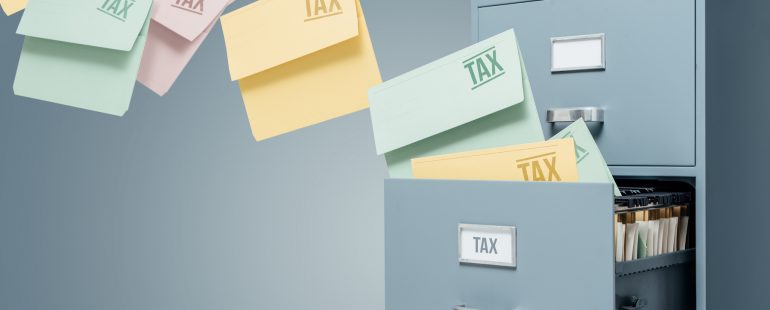Good recordkeeping is essential for individuals and businesses before, during, and after the upcoming tax filing season.
First, the law actually requires taxpayers to retain certain records for a specified number of years, for example, tax returns or employment tax records (for employers).
Second, good recordkeeping is essential for taxpayers while preparing their tax returns. The Tax Code frequently requires taxpayers to substantiate their income and claims for deductions and credits by providing records of various profits, expenses, and transactions.
Third, if a taxpayer is ever audited by the IRS, good recordkeeping can facilitate what could be a long and invasive process, and it can often mean the difference between a no change and a hefty adjustment.
Finally, business taxpayers should maintain good records that will enable them to track the trajectory of their success over the years.
Here you will find a sample list of various types of records it would be wise to retain for tax and other purposes:
Individuals:
Filing Status:
Marriage licenses or divorce decrees – Among other things, such records are important for determining filing status.
Determining/Substantiating Income:
State and federal income tax returns – Tax records should be retained for at least three years, the length of the statute of limitations for audits and amending returns.
Paystubs, Forms W-2 and 1099, Pension Statements, Social Security Statements – These statements are essential for taxpayers determining their earned income on their tax returns.
Tip diary or other daily tip record – Taxpayers that receive some of their income from tips should keep a daily record of their tip income. Under the best circumstances, taxpayers would have already accurately reported their tip income to their employers, who would then report that amount to the IRS. However, mistakes can occur, and good recordkeeping can eliminate confusion when tax season arrives.
Military records – Some members of the military are exempt from state and/or federal tax; combat pay is exempt from taxation, as are veteran’s benefits.
Copies of real estate purchase documents – Up to $500,000 of gain from the sale of a personal residence may be excludable from income (generally up to $250,000 if you are single). But if you own a home that sold for an amount that produces a greater amount of gain, or if you own real estate that is not used as your personal residence, you will need these records to prove your tax basis in your home; the greater your basis, the lower the amount of gain that must be recognized.
Individual Retirement Account (IRA) records – Funds contributed to Roth IRAs and traditional IRAs and the earnings thereon receive different tax treatments upon distribution, depending in part on when the distribution was made, what amount of the contributions were tax-deferred when made, and other factors that make good recordkeeping desirable.
Investment purchase confirmation records – Long-term capital gains receive more favorable tax treatment than short-term capital gains. In addition, basis (generally the cost of certain investments when purchased) can be subtracted from gain from any sale. For these reasons, taxpayers should keep records of their investment purchase confirmations.
Substantiating Deductions:
Acknowledgments of charitable donations – Cash contributions to charity cannot be deducted without a bank record, receipt, or other means. Charitable contributions of $250 or more must be substantiated by a contemporaneous written acknowledgment from the qualified organization that also meets the IRS requirements.
Cash payments of alimony – Payments of alimony may be deductible from the gross income of the paying spouse, if the spouse can substantiate the payments and certain other criteria are met.
Medical records – Disabled taxpayers under the age of 65 should keep a written statement from a qualified physician certifying they were totally disabled on the date of retirement.
Records of medical expenses – Certain unreimbursed medical expenses in excess of 10 percent of adjusted gross income may be deductible. Caution: a pending tax-reform proposal may change the deductibility of these expenses.
Mortgage statements and mortgage insurance – Mortgage interest and real estate taxes have generally deductible for taxpayers who itemize rather than claim the standard deduction. Caution: a pending tax-reform proposal may change the deductibility of these expenses.
Receipts for any improvements to real estate – Part or all of the expense of certain energy efficient real estate improvements can qualify taxpayers for one or more tax credits.
Businesses
Taxpayers are required by law to keep permanent books of account or records that sufficiently substantiate the amount of gross income, deductions, credits and other amounts reported and claimed on any their tax returns and information returns.
Although, neither the Tax Code nor its regulations specify exactly what kinds of records satisfy the record-keeping requirements, here are a few suggestions:
State and federal income tax returns – These and any supporting documents should be kept for at least the period of limitations for each return. As with individual taxpayers, the limitations period for business tax returns may be extended in the event of a substantial understatement or fraud.
Employment taxes – The Tax Code requires employers to keep all records of employment taxes for at least four years after filing for the 4th quarter for the year. Generally, these records would include wage payments and other payroll-related records, the amount of employment taxes withheld, reported tip income, identification information for employees and other payees; employees’ dates of employment; income tax withholding allowance certificates (Forms W-4, for example), fringe benefit payments, and more.
Business income – These would go toward substantiating income, and could include cash register tapes, bank deposit slips, a cash receipts journal, annual financial statements, Forms 1099, and more.
Inventory costs – Businesses should keep records of inventory purchases. For example, if an electronics company purchases a certain number of widgets for resale or a manufacturer purchases a certain number of ball bearings for use in the production of industrial equipment that it manufactures and sells. The costs of these goods, parts, or other materials can be deducted from sales income to significantly reduce tax liability.
Business expenses – Ordinary and necessary expenses for carrying on business, such as the cost of rental office space, are also generally deductible from business income. Such expenses can be substantiated through bank statements, canceled checks, credit card receipts or other such records. The cost of making certain improvements to a business, such as through buying equipment or renovating a property can also be deductible.
Electronic back-up:
Paper records can take up a great deal of storage space, and they are also vulnerable to destruction in fires, floods, earthquakes, or other natural phenomena. Because records are required to substantiate most income, deductions, property values and more—even when they no longer exist—taxpayers (and especially business taxpayers) should digitize their records on an electronic storage system and keep a backup copy in a secure location.
MMKR is already hard at work preparing for the busy tax season. Now is the time for you to begin preparing as well. Don’t wait until the new year to start looking for a tax preparer for your individual or business taxes, especially if there have been big changes in your circumstances. Call us at (952) 545-0424 to set up a consultation with one of our tax specialists.



